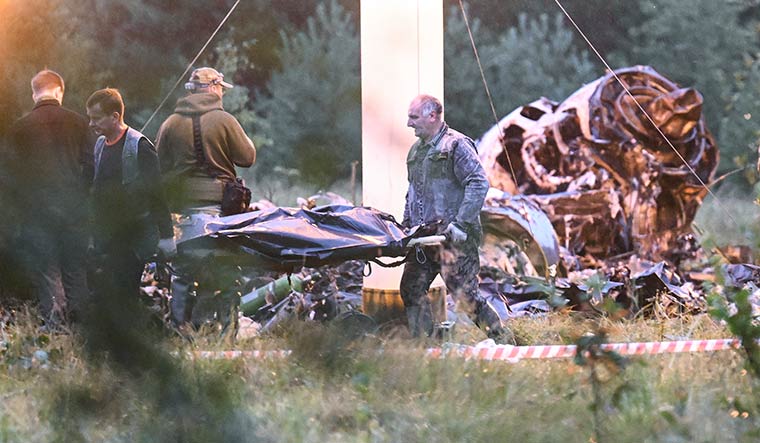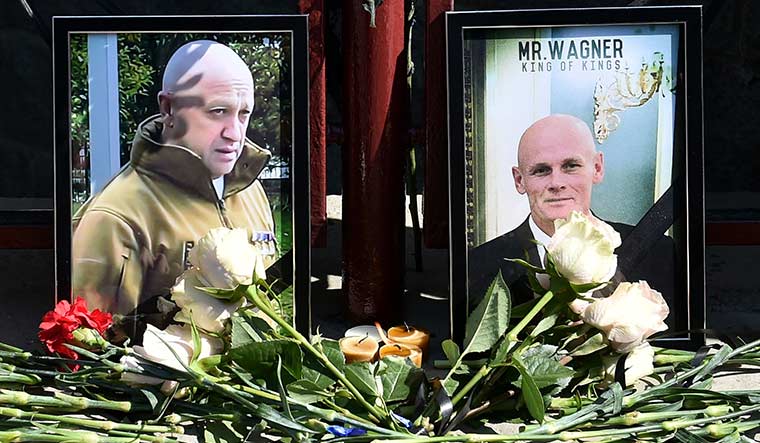Makeshift memorials for Yevgeny Prigozhin and commanders of his private army, Wagner PMC, mushroomed across Russia much before they were officially confirmed dead in a jet crash on August 23. From Rostov and Belgorod bordering Ukraine, to Tobolsk and Perm in Ural and Krasnoyarsk in Siberia, people of all ages came to lay flowers and light candles.
In Saint Petersburg, the birthplace of both Prigozhin and President Vladimir Putin, the memorial was in front of the former Wagner PMC office at Zolnaya Street. The makeshift memorial was filled with flowers and flags, icons and Wagner stripes and even soft toys. “He was the real patriot, he did a lot for Russia,” a man in his 40s said as he placed fresh carnations. For youngsters, the memorial quickly turned into a selfie point.
Prigozhin was among the 10 people on board the Embraer 135BJ Legacy 600 business jet flying from Moscow to Saint Petersburg that crashed over the Tyumen region. Several Wagner commanders died in the crash, including Dmitry ‘Wagner’ Utkin―whose call sign is believed to have given the private military company its name―and Valery Chekalov, Sergei Propustin, Alexander Totmin and Yevgeny Makaryan.
Commenting on Prigozhin’s demise even before it was officially confirmed by Russia’s investigative committee on August 27 (after DNA tests), Putin noted that the Wagner chief was “a man with a complicated life path” who “made serious mistakes” but also “delivered results”.
Many officials echoed Putin’s assessment of Prigozhin’s personality. Ramzan Kadyrov, the head of the Chechen Republic in southern Russia, said achievements “cannot be denied”. But he was quick to underline that “in recent times” the Wagner chief “failed to see or refused to see the greater picture”. Kadyrov claimed he urged Prigozhin to drop personal ambition. “But that’s how he was, Prigozhin, with his iron character and desire to get his way right here and now,” he said.
Leonid Slutsky, an MP from the Russian nationalist LDPR party, who had lashed out at Prigozhin during the Wagner mutiny, calling him a “traitor” and suggesting he was being used by the west to weaken Russia, said, commenting on the deadly plane crash, that while their views differed at the time, the head of Wagner “did a lot to achieve the goals of the special military operation.”
While the Kremlin denied any involvement in Prigozhin’s death and pro-Kremlin political commentators suggested the hand of Ukraine’s intelligence, many in Russia did see it as “revenge” for the rebellion. But, Belarus President Alexander Lukashenko said: “I know Putin. He is a calculating, very calm and even slow person, making decisions on other, less complex issues. Therefore, I cannot imagine that Putin did it, that Putin is to blame. It’s too rough, unprofessional work.” He also noted that he had received information about a possible attempt to assassinate Prigozhin. He passed this information to Putin and FSB Director Alexander Bortnikov. Later, said Lukashenko, Prigozhin told him he had received the information from Putin.
Prigozhin also told Lukashenko he would die a hero.
The fact that Prigozhin was not punished, but rather spared and only “exiled” to Belarus, showed he was “dear to many”, political commentator Alexander Morozov told Prague-based Current Times, which is run by a media organisation funded by the US government. As political analyst and senior fellow at the Carnegie Russia Eurasia Center Tatyana Stanovaya pointed out, people close to the Kremlin believed people like Prigozhin did not deserve such death. At the same time, she said, Putin no longer needed Prigozhin.
 A fiery death: A body being carried away from the site of the crash | AP
A fiery death: A body being carried away from the site of the crash | AP
“Wagner’s infrastructure in African countries and Syria can either be transferred under the control of state structures, or it can find a new loyal boss,” she said. “And the tools of foreign information campaigns and sabotage (such as Prigozhin’s troll factory) have long been actively mastered by the Russian special services.” She noted that the conservative section of society (and power elites) saw Prigozhin’s death a well-deserved outcome.
Prigozhin had no illusions. Ksenia Sobchak, TV celebrity-turned-journalist and daughter of Putin’s mentor and former Saint Petersburg mayor Anatoly Sobchak, revealed shortly after the plane crash that she had requested Prigozhin for an interview days before the crash. In what she claimed was a screenshot of their correspondence, he responded that now was not the time as he would get “arrested”, and added that if he had agreed to give the interview when she had requested him earlier, he would have been “finished”.
After the rebellion, Prigozhin’s influence on domestic policy was rigorously suppressed. Earlier in 2022, there were talks of Prigozhin starting his own political party or gaining partial control of the A Just Russia party. Following the uprising, the rumours ceased abruptly. A larger network of organisations, activists and media personalities, including some foreign-language bloggers, that were indirectly associated with Prigozhin and his media empire―Patriot Media―reduced or refocused their activities. In general, those associated with Prigozhin were advised to be cautious as they would not be spared, unlike the Wagner chief and his fighters.
The big task for the Kremlin now is how to deal with Wagner. A few days after Prigozhin was confirmed dead, Andrey Kartapolov, head of a parliamentary defence committee, said legislators would continue to work on a bill regarding the status of PMCs in Russia. He added that work was ongoing and it was too early to say anything concrete.
The push to regulate PMCs had been criticised by Prigozhin, who said in March that such a law was not needed and the PMCs had been “performing tasks” in Africa, Asia and other countries “according to the [local] laws”. This remark would be interpreted differently in the context of the mutiny he staged months later. And the renewed push to adopt the law regarding PMCs was made immediately after the rebellion was called off.
According to a popular political channel Ne Zygar, a series of focus groups in three metropolises after Prigozhin’s death showed that opinions on the Wagner Group and the concept of PMCs were divided. For many, the concept of PMCs is seen as relevant, but, according to the study’s participants, they should not engage in direct confrontation with the ministry of defence. Interestingly, the same poll showed that there were quite a few supporters of the theory that the plane crash was staged and Prigozhin had “stepped out of the game” and gone underground, perhaps to Africa.
Western media has claimed that Russia could lose its grip on Africa after Prigozhin’s death. The reality might be different. Russia recently hosted a grand Russia-Africa summit, attended by delegations from 49 countries. Putin spent three days interacting formally and informally with African leaders, underscoring Moscow’s intent to play a much bigger role on the continent as the erstwhile Soviet Union did. While Prigozhin reportedly made a brief appearance on the sidelines, with a photo of him shaking hands with an African official doing the rounds on social media, he was not seen at the main venue.
Yevgeny Minchenko, the president of the International Institute of Political Expertise, said it will be difficult to replace Prigozhin in Africa. “In international relations, a lot is based on personal chemistry and communication. If an outsider comes now, he may not be effective.”
But Andrey Zaharov, Russian investigative journalist and former BBC correspondent who wrote extensively on Prigozhin’s “troll factory” and the US elections (he is among many journalists and activists labelled foreign agents by Kremlin), claimed the process of squeezing Prigozhin out from Africa had started before his death. Russia had been trying to hamper Wagner’s operations, for example, convincing local authorities not to allow their planes to land, Zaharov shared on his Telegram channel. He said, citing sources, that this was happening despite Putin having personally assured Prigozhin that he could continue “dealings” in Africa and Syria.
On August 22, a Russian delegation headed by Deputy Minister of Defence Colonel General Yunus-Bek Yevkurov arrived in Libya for the first official visit by a Russian military delegation to the African country. Some media reports suggested Yevkurov visited Syria and several African countries where Wagner had been operating.
The complicated but charismatic Prigozhin was buried at Porokhovskoe cemetery in Saint Petersburg. It is certain that his death would not influence the 2024 presidential polls. A section of society is largely supporting Russia’s actions in Ukraine and will continue to do so as long as the conflict burns. For them, Russia emerging victorious is the priority―no matter who moves the pieces.


